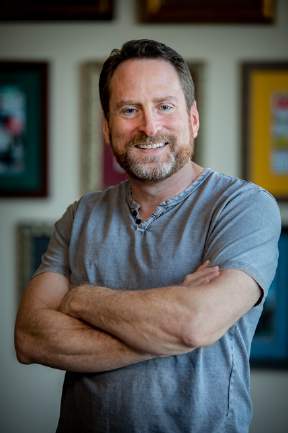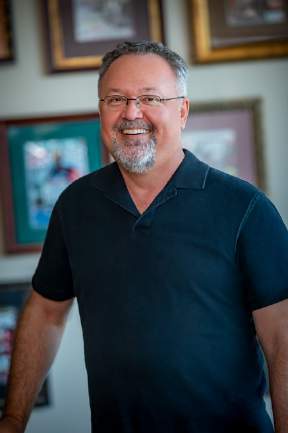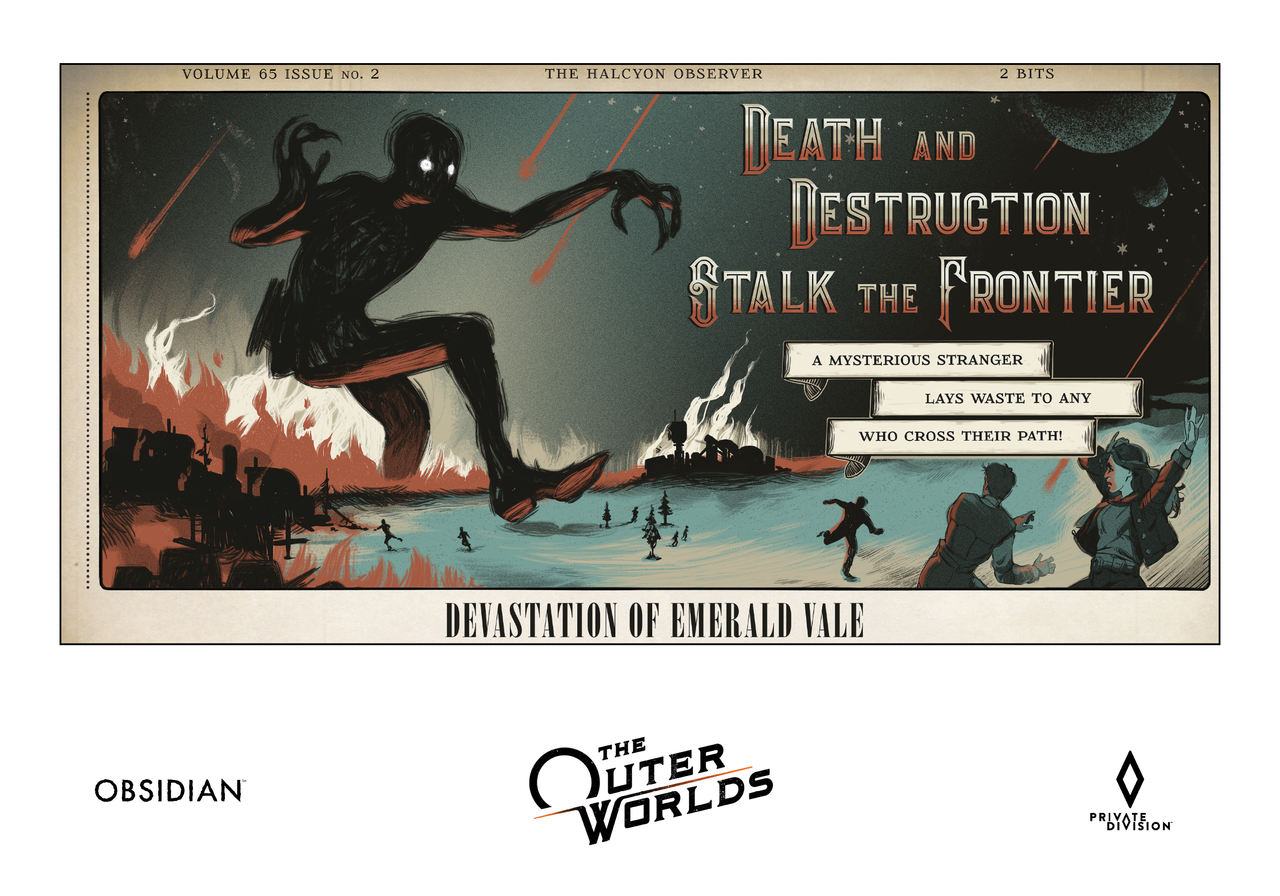The reveal of Obsidian Entertainment's The Outer Worlds was a highlight of the The Game Awards 2018. The studio has built up a solid reputation over the years for crafting creative and engrossing narrative-heavy RPGs, and if nothing else, The Outer Worlds shows many signs of being directly inspired by recent entries in the Fallout series, one of which--New Vegas--was developed by Obsidian less than a decade ago. The Outer Worlds is also the brainchild of Tim Cain and Leonard Boyarsky, two creatives with a storied history in PC gaming. Their most notable chapter by far? When they and a small band of collaborators created the original Fallout in the mid '90s. But after following up with Fallout 2, they've had to watch while Bethesda took the series in its own direction--despite being at Obsidian now, neither Cain nor Boyarsky were working there at the time of New Vegas' development.
We recently published a deeper dive into The Outer Worlds that speaks to a behind-closed-doors demo, covering aspects of the game's story, character progression, and combat. In the interview below, we get into the mindset of the two co-directors. It's obvious from the start that they have Fallout on the brain, lending credence to the suspicion that The Outer Worlds bears some striking similarities.
On the other hand, it also veers away from the grime and dirt of a post-apocalyptic Earth in favor a world with vitality. For as much as they are exploring ideas that likely, in some fashion, link back to their days making Fallout, Cain and Boyarsky are most excited about heading into uncharted territory.
Continue reading to hear their thoughts on reuniting after years and games apart, and where they hope to take their audience when The Outer Worlds releases on PC, PS4, and Xbox One in 2019.
What was the feeling in your gut leading up to this reveal?
Tim Cain: We just really wanted to show it. We have all these things that are funny or cool, but we couldn't talk about it.
Leonard Boyarsky: We are very happy with where it's at. We think it looks great, we think it plays great. It's what we wanted to make when we started it, but at the same time you never know how people are going to react. To be able to finally show it and see how people react is cathartic.
I think I've seen you [Boyarsky] quoted online as saying this is a "dream project." What aspect of this, would you say, is the dream?

Boyarsky: Oh, it's definitely working with Tim! [laughter] No, but it is though; that is exactly what I meant. I worked on a couple games before Fallout, and Tim worked on a couple games before Fallout, but that was pretty much our start of working on games that we have creative control over. We created Fallout from scratch, we basically had complete creative control and did whatever we wanted to--same thing with Arcanum. It had been a really long time since we created an IP from scratch. We're really good friends, we complement each other's strengths and weaknesses really well. Not many people are fortunate enough to find that kind of person to work with in their careers, and we were lucky that it was very early in our careers and we have this really great synergy when we get together and start doing this stuff.
We've never really made a pure sci-fi game. Fallout was sci-fi, but it was more post-apocalyptic than sci-fi. So it was one of these things where we're really big fans of science fiction; I personally love fantasy, but I much prefer science fiction if I have to choose between them. So it was weird that we'd never gotten around to do one, and when this opportunity came up it was like, "Yes, I can work with Tim again and we can create an IP from scratch!" It was basically this laundry list of things that I thought...that the next game I wanted to work on would be if I could say "here's the stuff I want to do," and this was it.
If you can really put yourself back in your own shoes in the '90s, compared to today, what aspect of your current responsibilities do you love, and what do you miss from those times that you worked in an attic, and…
Boyarsky: Well for me I still love the things I loved then, creating a world from scratch, it's just the best part about this. I love creating unique worlds with a unique feel and a unique look. The thing I do have to say I miss is that when we made Fallout and Arcanum, it was a very small team. We got to do all the stuff we're doing now but we also got to do…Tim did programming, I did design, like a lot of art on Fallout. I was the lead artist and the art director, and I was also doing like havlf the animations in the game, modelling stuff, texture mapping. I didn't end up scripting on that one, but I scripted in Arcanum. Working on those small teams you end up having your hand in everything.
For [The Outer Worlds] we are much more directors. It's our vision, but we have a lot of very talented and wonderful people that we're working with who have done things that, especially from an art standpoint, I don't know that I would have brought it in that direction, but in a good way. We pointed them in a direction and they ran in directions that we never could have anticipated. In a way that's very rewarding because you feel like you gave people a germ of an idea and they got to make it their own and it comes back to you and you see what people have done. But on the other hand, I'm not in there doing that every day. I'm making sure people are heading to the right destination and fulfilling our vision of the game. I've been able to do some writing, some hands-on art direction, but for the most part a lot of people are doing the actual nuts-and-bolts work that we used to do on a day-to-day basis.

Cain: Plus, one thing, in the '90s you could do things no one had ever done before because everything was so young and it was a bit of a Wild West of an industry. Now every time you think of something and you look, it's like, "Oh, this game did it. This indie game did it five years ago." It's hard to think of something that is completely original.
We managed to put some things in here that I've never seen done in a game. In that way, I kinda miss that…the sky was the limit back then. If you could think about it, you could do it.
Boyarsky: Well a perfect example of that is, when we made Arcanum, I didn't even really know what steampunk was. Now there is like every kind of punk there is. When we started talking about this game and the setting we had to be very careful not to fall into this pre-defined thing that has been done before. That's very important to us. We didn't want people to look at it and know exactly what this is, because people didn't do that with Fallout because nobody had seen something like that before. Between now and then, there's been every kind of mish mash of different styles. I mean, hopefully people took inspiration for Fallout for some of that stuff.
Cain: We didn't want to make Tolkien with machine guns. One thing I've done, every time I ship a game I write a postmortem, just for myself; it doesn't get published. I write a postmortem of everything I think went right and wrong, and I also keep notes whenever I have an idea. So I went through them for this game and found some ideas from a few years ago that I'd like to try out. And here's what I thought went wrong with Temple, or Vampire, or Fallout.
I even write, I probably shouldn't, but every time I play a Fallout game I write a postmortem for it. I have a postmortem for Fallout 3, Fallout 4, and New Vegas, even though I didn't work on them. So I read through all those notes, to recall what I thought they did right and what I thought they did wrong. And that influenced a lot of what I'm doing with this game.
How often, if ever, do industry trends or audience demands seep into your priorities?
Boyarsky: A lot less than we probably should. [laughter] We've always been really interested in making the games that we don't think are out there. Maybe there's a good reason why some of them aren't out there.
Cain: We always like to joke, "Let's just make the games we like, and hopefully people will play them." We have been trying to understand what people have been asking for. I know when we put our combat system together, it was really important that it be an RPG, but people really want…
Boyarsky: Yeah but it's less of a thing where we go, "Look at what people are looking for." We really don't want people to be saying, "Wow, this is a great RPG, you know the combat is just okay, but the RPG stuff is great."
One of our goals is that we want combat to be fun. Obviously our combat isn't going to be as good as Call of Duty because that's not what we are here to do. So, in that aspect when we set out to do something like that, well then what would people think is a fun combat system? What do people want from a combat system that they would consider fun? I think we've been in that mode for years, but I'm not sure that we've ever focused on those things as much as we have with this one.

I think it's much more a matter of, I don't want to say age, but just the length of time doing this. Earlier on Tim was saying that when we set out to make this thing that's a conglomeration of '50s and Road Warrior and pulp sci-fi, that wasn't something that people had done before, or the aspect of it where it's very gray morality and you could play anyway you wanted to play. With those things, because as Tim said that was a time when it was the Wild West where nobody had done that stuff before, now we have to look at what hasn't been served. We don't want to just rehash old ground. That's how we look at what people might want or what needs to be done in other games. Sometimes it might even inform, I don't want to say negative, but it might reinforce the opposite.
Like, a lot of games are going towards cinematic storytelling, but to do that you have to have a voiced protagonist. One of our main goals here, as with all of the games we made together, we want people to be able to play this game any way they want to play. We want the person who wants to play as the upstanding, righteous hero who would never do anything a little bit gray to have fun and role-play the way they want to, as much as the person who wants to play the psychopath that wants to kill everyone in their way. Both of those should be fun. But if we picked a voice for you or a character for you that was premade, then no matter how much we let you tweak it, it still feels like there's a part of it that wasn't decided by me. I think it's both things: What do we think is really cool that hasn't been done, but what are things that people are doing? Do we want to take that, or do we want to keep it more old-school because this is what we get from it?










